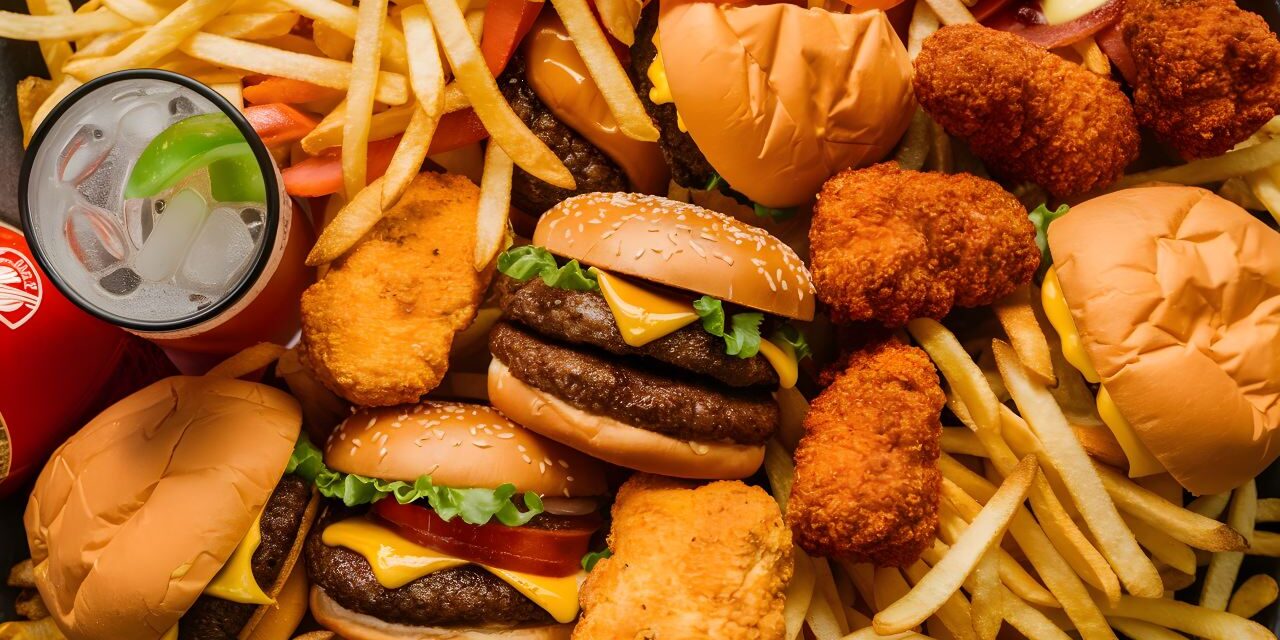- The Hidden Risk in Processed Food: Cheap Convenience, High Cost
Ultra‑processed foods (UPFs)—those industrially manufactured packages with unrecognizable ingredients—have silently become staples for millions. They’re calorically cheap but biologically expensive. A meta‑analysis of nearly 10 million individuals found that every 10% increase in UPF consumption raised type 2 diabetes risk by 12%. UPFs were also linked to a 15% increase in all‑cause mortality en.wikipedia.org+1nypost.com+1. Worse, these foods ignore men’s specific health needs—blocking muscle growth, lowering testosterone, and feeding emotional fragility. If masculinity depends on energy, strength, and mental clarity, why are men letting factory‑made sludge dictate their biology?
- What Processed Junk Does to Men’s Bodies and Minds
Today’s western diet is heavily laden with trans fats, artificial sweeteners, refined oils, and emulsifiers—all of which disrupt endocrine function and raise cortisol medicalnewstoday.com. Specifically, trans fats have been linked to a significant 15% drop in total testosterone in men healthline.com. Added sugar and refined carbs cause insulin spikes, increased fat storage, and metabolic derangement. Men already face higher rates of heart disease, stroke, and suicide; adding processed junk is like igniting gasoline. If masculine purpose demands clarity and energy, eating canned calories is surrendering to sedation.
- Whole, Accessible Alternatives: Real Food for Real Men
The solution isn’t fantasy—it’s pantry staples and farmer’s market finds:
- Whole grains: oats, quinoa, brown rice — fiber‑rich, balanced energy (47,500-woman study, fiber improved metabolism) .
- Fruits & vegetables: blueberries, kale, carrots — antioxidants, microbiome fuel, anti-inflammatory com.
- Nuts & seeds: almonds, walnuts, chia — healthy fats, selenium, magnesium.
- Lean proteins: eggs, chicken, grass-fed beef — muscle repair, testosterone support.
- Legumes: beans, lentils — fiber, protein, blood sugar stabilization.
These foods are everywhere—grocery stores, farmers’ markets, co‑ops. They’re budget‑friendly, testosterone‑supporting, and far more filling than processed alternatives. If men are tired of feeling numbed, these foods are the most accessible lifeline.
- Diet Comparison: Processed vs. Whole Foods Outcomes
Let’s compare two diets over six months in men aged 30–50:
Processed Junk Diet:
- Daily energy +300 kcal from snacks/sodas.
- Gains 5–7 lbs of fat, reduced testicles size.
- Insulin resistance markers elevated; LDL cholesterol up by 15%.
- Testosterone down 12–15%; energy low, libido tanked.
Whole-Foods Diet:
- Replaces UPFs with vegetables, whole grains, clean proteins.
- Weight stable or lean mass increases by 3–5 lbs.
- Blood sugar steady, LDL down 10%, HDL up 7%.
- Testosterone measured 8–10% higher; energy, focus, gym performance improved.
These aren’t diet tricks—they’re metabolic realities. When men eat as if their bodies matter, they start feeling like they do.
- Mind, Mood & Fertility: Nutrient Density Over Sugar
Processed diets aren’t just bad for bodies—they throttle minds. The GAIA Study linked UPF-heavy diets to burnout, depression, and poor recovery thetimes.co.ukeatingwell.com+7sciencedirect.com+7verywellhealth.com+7en.wikipedia.org+1frontiersin.org+1foodandwine.com. Depression and suicide are more common in men, yet mental health advice rarely addresses food’s role. Meanwhile, whole‑food plant‑based and Mediterranean-style diets stabilize mood, support gut-brain health, and improve sleep . Men owe it to themselves—and the women and children around them—to stop feeling like emotional skeletons on autopilot.
- Dating, Masculinity & Food: The Unseen Social Cost
A man who eats garbage looks, moves, and feels lesser—often invisible to women in the dating marketplace. Modern dating algorithms favor men who show muscularity, vitality, and confidence—and these are grounded in diet. While women enjoy social validation regardless of diet, men must perform. A man on junk food is losing the competition before he’s even seen. If masculinity is performance rooted in biology, junk food isn’t just poor fuel—it’s sabotage.
- Empowering Women Through Masculine Health
Women are told to demonize male power—but often want it, just hidden. A man who leads by example—fueling his body with clarity—is a partner, not a threat. Women who eat along are healthier, happier, and feel more supported. By following the male nutritional model of whole foods, they gain longevity and an equal partnership. Feminism teaches independence—but paired autonomy—built through shared health and purpose—might be the real path to balanced relationships.
- How to Transition: Concrete Steps for the Modern Man
- Remove the processed: no soda, chips, sugary cereals.
- Swap to accessible real food: canned beans, frozen veggies, whole oats.
- Aim for 5–7 food species per meal.
- Monitor effects: energy, focus, libido, sleep.
- Add resistance training to magnify benefits.
- Till sugar cravings fade, drink water, coffee, herbal tea.
- Refine over 6 months: gut, body comp, hormones shift.
Simplicity becomes sovereignty when practiced daily.
- Conclusion: Masculine Freedom in Food Sovereignty
Avoiding processed junk isn’t about perfection—it’s about choice. It’s a statement that a man values his future more than fleeting pleasure. In a world that pushes for weak, compliant, and distracted men, choosing whole foods is rebellion. And freedom. Do you want to be another product of cultural FDA—average, medicated, forgotten—or do you want to prove you value yourself? The store is your battlefield, your draftsmen table, your transformation zone. Will you shop your way to decline—or stand by your sovereignty?
Key Takeaways
- UPFs cause a measurable decline in health—both mental and physical sunnyhealthfitness.comen.wikipedia.org.
- Replacing processed food with accessible real food prevents weight gain, stabilizes hormones, and enhances energy.
- Nutrition is central to masculine identity, dating success, family leadership, and personal sovereignty.
- Small, consistent changes (remove/add/synchronize) yield massive long-term gains.
Choosing food isn’t just eating—it’s saying yes or no to who you become.











